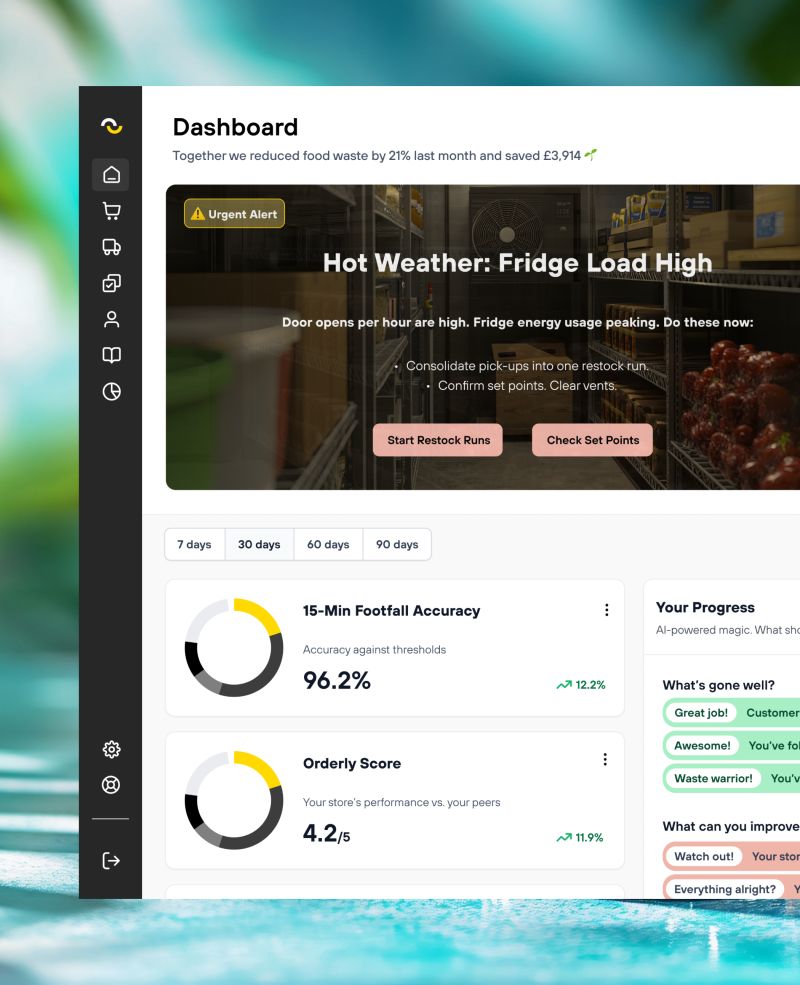Running a multi-site hospitality business is a complex balancing act. Whether you oversee quick-service restaurants, pubs, or cafés, the demands on your teams are relentless: managing stock, maintaining service standards, optimising labour, and ensuring every location operates at peak efficiency—all while controlling costs.
In fast-paced environments, managers are often forced to react to problems rather than prevent them. The result? Operational inefficiencies, inconsistent service, and unnecessary costs. But what if AI could detect risks, anticipate needs, and proactively assign tasks—so your teams don’t have to spend every shift firefighting?
With AI-powered vision technology and real-time task management, enterprise hospitality businesses can eliminate operational blind spots. Here are five common challenges that AI now handles automatically, allowing managers and frontline teams to focus on delivering exceptional customer experiences.
1. Managing Queues and Service Bottlenecks in Real Time
Long queues and slow service frustrate customers and reduce revenue per hour—but many locations only react once a bottleneck is already causing delays. In a high-volume environment, staff don’t always notice queues forming or service slowing down until customers start leaving.
AI-powered queue monitoring and speed-of-service tracking solves this. By analysing CCTV and sales data in real time, AI can:
✔ Detect queue build-up and order bottlenecks early.
✔ Prompt managers to open an additional till or reassign staff.
✔ Track speed of service and flag sites that are underperforming.
With AI-driven insights, managers can resolve bottlenecks before they impact service times or customer satisfaction, rather than reacting when it’s too late.
2. Preventing Stockouts and Overstocking Without Manual Checks
Stock control is one of the biggest challenges in multi-site operations. Underordering leads to lost sales, while overordering results in excess waste and unnecessary costs.
Instead of relying on manual stock checks or reactive reordering, AI-powered inventory monitoring:
✔ Tracks stock levels in real time—without requiring staff intervention.
✔ Analyses historical sales trends to predict future demand.
✔ Automatically suggests or triggers supplier orders based on forecasted needs.
For large-scale operations, AI removes the risk of inconsistent stock levels across locations, ensuring every site has the right amount of product at the right time—without the guesswork.
3. Ensuring Compliance with Cleaning and Food Safety Standards
From maintaining food safety standards to ensuring front-of-house areas remain clean and welcoming, compliance checks are time-consuming. Managers must balance customer-facing tasks with ensuring that required cleaning, temperature checks, and compliance processes are completed consistently.
AI automates compliance tracking by:
✔ Detecting spills and unclean tables and prompting staff before customers complain.
✔ Monitoring refrigeration temperatures and flagging issues before product loss occurs.
✔ Ensuring food prep areas meet hygiene standards by analysing real-time video feeds.
This eliminates the need for constant manual oversight, allowing staff to focus on service while ensuring every site meets brand standards and regulatory requirements.
4. Optimising Labour Allocation for Maximum Efficiency
Labour is one of the largest cost centres in hospitality, and poor allocation leads to either wasted spend or underperformance during peak periods. Traditionally, managers rely on intuition or historical data, but AI enables real-time, dynamic labour optimisation.
By continuously analysing footfall, order volume, and prep times, AI can:
✔ Automatically reassign staff between front- and back-of-house based on demand.
✔ Predict when additional staff will be needed and notify managers in advance.
✔ Optimise break schedules to ensure coverage without overstaffing.
This ensures every shift is staffed correctly, improving efficiency without increasing labour costs unnecessarily.
5. Reducing Waste and Improving Sustainability Goals
For enterprise hospitality brands, waste reduction is not just a cost-saving measure—it’s a sustainability imperative. Yet, most waste prevention is reactive, relying on post-shift reporting rather than live intervention.
AI-driven waste tracking prevents losses before they happen by:
✔ Identifying high-waste menu items and recommending portion or prep adjustments.
✔ Tracking expiry dates and usage trends to suggest stock redistribution before waste occurs.
✔ Providing real-time insights into waste patterns across multiple locations, allowing brands to benchmark performance and implement targeted improvements.
For large-scale operators, this means consistent waste reduction across the entire estate, not just isolated improvements at individual sites.
How AI is Transforming Enterprise Hospitality Operations
The most successful enterprise hospitality brands are those that move from reactive problem-solving to proactive, AI-driven efficiency. With AI-powered vision technology and automated task management, large-scale operators can:
✅ Identify inefficiencies before they impact service, revenue, or costs.
✅ Ensure brand standards and compliance across every location.
✅ Empower managers to lead, rather than firefight operational issues.
✅ Improve profitability and sustainability through AI-driven decision-making.
No longer nice to haves in the competitive market of today - these kind of systems are operational necessaries.
Orderly’s Digital Store Assistant is already helping enterprise hospitality brands unlock these efficiencies.
📩 Want to see AI-powered efficiency in action? Contact us to learn how we can help transform your operations at scale.










.svg)

.svg)
.svg)